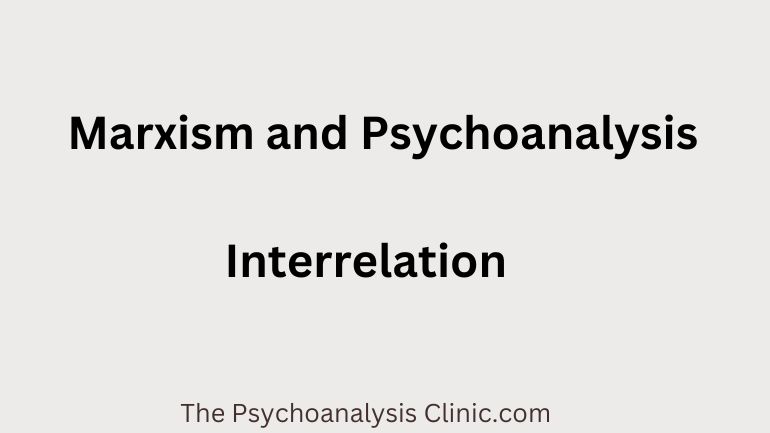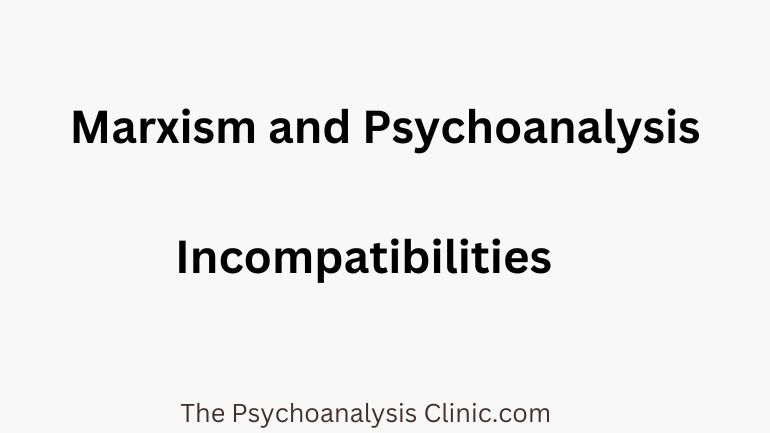Psychoanalysis and Marxism Overview

Psychoanalysis and Marxism are two different theories that try to understand society and psychological human suffering.
There are various ways of articulating these two concepts, some more critical and others more conciliatory.
One of them is Freudo-Marxism, which combines the psychoanalysis of Sigmund Freud and the philosophy of Karl Marx.
What is Freudo-Marxism?
Freudo-Marxism is a social theory based on the works of Karl Marx (Marxism) and Sigmund Freud (psychoanalysis).
These perspectives try to understand the relationship between mental health and social processes, using the conceptions of alienation, repression, the unconscious, and ideology.
Some influential figures of Freudo-Marxism are Wilhelm Reich, Herbert Marcuse, Erich Fromm, Louis Althusser and Slavoj Žižek.
Table of Contents
What is the relationship between Psychoanalysis and Marxism?

The relationship between psychoanalysis and Marxism is a complex and controversial issue that involves different ways of approaching society and humanity.
The concepts of Freud and Marx seek to understand the mental structures and social aspects of alienation, repression, and ideology.
The limits and differences between the two theories emphasises the epistemological, ontological and historical incompatibilities between them.
However, the contributions and problems of each perspective are valuable without reducing one to the other.
What are the incompatibilities between Psychoanalysis and Marxism?

Some incompatibilities between psychoanalysis and Marxism are:
- Psychoanalysis is based on an individualistic and naturalistic conception of the subject, which ignores the historical and social determinations of a society. Marxism, on the other hand, is based on a materialist and dialectical conception of the human being, which considers the relationship between the economic structure, and class struggle.
- Marxism focuses on analysing objective reality, the contradictions of capitalism, alienation and ideology, which are historical and changeable. Psychoanalysis focuses on the analysis of the unconscious, drives, childhood conflicts and defence mechanisms.
- Psychoanalysis sets out to cure the neurotic symptoms of individuals, without questioning the social order that produces them. Marxism sets out to radically transform society, overcoming the exploitation and oppression that generate human suffering.
- Marxism believes that the economic factors are essential for healthy human mind. Freud did not believe that even in an equal society without class oppression would free humans from psychological sufferings.
What did Freud think of Marxism?
Freud didn’t have a clear position on Marxism. He recognised the importance of Marx as a revolutionary thinker, but also had some reservations about his theory of history and society.
Sigmund Freud thought that Marxism underestimated the role of the unconscious, drives and sexuality in the formation of human subjectivity.
He also doubted that overcoming capitalism would be enough to eliminate psychological suffering, as it had deeper roots in human nature.
However, Freud was not opposed to Marxism, nor did he consider it incompatible with psychoanalysis.
He even supported some socialist and communist movements, such as the 1917 Russian Revolution and Bavarian Socialist Republic in 1919.
Freud also maintained contact with some Marxist intellectuals, such as Georg Lukács, Wilhelm Reich and Herbert Marcuse, who tried to articulate psychoanalysis with Marxism from a critical and emancipatory perspective.
What Freud and Marx had in common?
Freud and Marx had some things in common, such as:
- Both were born in the 19th century, Marx being older than Freud, and were influenced by the historical and social context of the time.
- Both dedicated themselves to the study of humans and society, seeking to understand the causes and consequences of psychological and social phenomena.
- Both adopted a materialist and dialectical perspective, which considered reality to be a dynamic, contradictory and historical process, involving conflicts of interests and forces.
Was Freud an atheist?
Freud was born in a Jewish family, but he didn’t practise Judaism. He considered himself an atheist and criticised religions. Despite being an atheist, Freud took up religious studies.
Psychoanalysis in the Soviet Union
Psychoanalysis arrived in the Soviet Union shortly after the 1917 Russian Revolution and was initially supported by the Bolshevik leaders, who saw it as a form of human and social emancipation.
Some Russian psychoanalysts, such as Sabina Spielrein and Vera Schmidt, had direct contact with Freud and contributed to the development of psychoanalysis in the URSS.
However, from 1921, Lenin signed a decree giving Pavlov special privileges. And during the Stalinist period, Pavlov’s psychology was encouraged at the expense of other theories. Hence, psychoanalysis was rejected in the Soviet Union for being a bourgeois ideology and contrary to Marxism.
Ivan Pavlov’s psychology refers to the studies of classical conditioning, a type of associative learning in which a response becomes automatic after a stimulus conditioning.
Leon Trotsky backed psychoanalysis; he believed that Freud’s ideas were as materialistic as Pavlov’s.
However, Trotsky’s views were not taken into consideration. He lived in exile where he was assassinated. Some say by Stalin, the latter never admitted it.
After the death of Stalin, Pavlovian psychology declined in importance and Vygotsky’s theories became more significant.



